- Home
- Matthew Pearl
The Professor's Assassin Page 3
The Professor's Assassin Read online
Page 3
“Thank you, Professor Cabell.”
That afternoon at the Davis pavilion, Rogers was admitted to the upstairs bedroom where the law professor was recovering. His heart sank to see the ghastly white, vacant demeanor of his once vibrant, easy-mannered colleague. Worried that his face betrayed his dismay, he busied himself by fixing the blinds to keep out light and bringing the chair closer to the bed.
“Rogers, thank you.” Davis reached out his hand and pressed Rogers’s arm.
“John?”
“You saved my life by acting when you did.”
“It was your boy Jack who rescued you,” Rogers said. “I merely answered his call.”
“Sally and Jack are treasures. Treasures! That boy is as devoted to his noble mother as any white boy I’ve known.”
Rogers hesitated, thinking about what the sheriff had said. “Do you have the strength to say more about what happened last night?”
Davis nodded feebly and cringed as he positioned himself higher on the pillow with Rogers’s help. “Thank you, my friend. I shall tell you what I can. A while after you accompanied Professor Harrison to his residence, the rowdies had quieted. I prayed the worst was over. I began writing a letter to the students, accepting a meeting with the leaders of the riot. But then there was another report of gunfire. I went outside to investigate.”
“You should not have gone alone, John! You could have sent Jack to my pavilion to fetch me.”
“As chairman, I am duty-bound to preserve order at all times,” said Davis, weakly offering one of his spontaneous, soothing smiles. “I may not scale mountains in my leisure time, my dear Professor Rogers, as you do, but I am capable of administering discipline. When I reached the point of the disturbance, I saw two of the men in masks. I reached out for one of them. I said I would like only to speak to him for five minutes, face-to-face, and attempted to remove his mask. He ran. I tried to give chase. But he was too fast for me, and I gave up. So I turned and began to walk back here. That is when I heard the sound of his footsteps cease. I turned to look. He had stopped to aim his weapon, and he fired.”
“You mean you had stopped your pursuit—that you had turned your back—before he fired?” He heard his own voice challenging his pursuer from earlier that fateful night: Would you shoot a man in the back?
The victim’s nod was slight and melancholy. “Your thoughts are crowded.”
Rogers struggled to hold in check his rising anger against the unknown assailant, for fear of worsening his friend’s fragile state. “Yes, I suppose. I was followed from Harrison’s pavilion last night after we left the meeting. The student did me no harm, but he threatened me with a pistol. I begin to fear I riled him up by unmasking one of his friends and that, his blood boiling, he did this to you.”
“Do not be foolish, my friend,” Davis replied. “Why, I doubt the young man who did this could explain why he did.”
“When we found you, you had said you knew who it was,” Rogers said as calmly as possible. “Do you remember?”
Davis’s eyes flickered with alarm. “Have they come any closer to catching the man?”
“No.”
“I am glad of it,” exclaimed Davis, his expression relaxing. “I am very glad of it! I hope they do not touch a hair on his head.”
“When you grabbed hold of his mask,” Rogers pressed, “did you see underneath?”
“I understood your question the first time, my dear fellow. As I told the sheriff, I will not answer.”
“You mean you did not see?”
“He means simply what he says.” It was Mary Jane Davis, standing in the doorway to the room, with her arms folded tightly over her chest. “My family will not be a party to helping to apprehend the person who did this.”
Rogers could not believe it. How could the Davises protect the rogue who had tried to assassinate him? Without Davis telling the sheriff what he knew, the perpetrator could escape all consequences of this heinous act.
All Rogers could do was nod. Neither Davis nor his wife was in any condition to be argued with. But to his surprise, Davis was not satisfied with his reaction.
“Promise me you will allow my wishes to stand. That you will not press me for the information,” he said. “Understand, to name the young man would accomplish nothing but sating a thirst for revenge. Extreme punishment will be called for. Matters will escalate. It will tie this university—a place I love—into a twisted knot of violence. It must end here. Promise me.”
“John,” Rogers replied. “You have my word.”
“Bless you.” He squeezed Rogers’s hand.
When the visit came to a close, Sally Cottrell tended to the patient. Mrs. Davis took Rogers aside, which surprised him. He had never spoken much to her, his time with the chairman of the faculty spent mostly in connection with university affairs. Grandniece of Thomas Jefferson, she was a quiet, petite woman with a narrow, almost severe face but gentle eyes not unlike her husband’s.
“I am glad you spoke with him, Professor Rogers,” she said. “He respected you.”
Her use of past tense disturbed him. Of course, the poor woman was still overwhelmed with anxiety and exhaustion, and surely would be for a long time. “God willing, his recovery will be complete in a week or two, Mrs. Davis,” said Rogers.
“No. It will not be.”
“Pardon?”
“My husband’s end is near, Professor. That is why it pleases me you could be here to say goodbye.”
“I wasn’t here to say—Mrs. Davis,” Rogers found himself speaking sternly, despite the delicate situation, “Professor Cabell and the other doctors declared him out of danger.”
“A man cannot have a piece of metal tear through his insides and survive long, Professor Rogers. Can he?”
“The doctors—” Rogers began to protest, but he did not know what else to say. She began busying herself in prayer with two of her daughters as her youngest boy, not yet two years old, clung to her. Rogers quietly took his leave, feeling like an interloper in this house of grief.
Chapter 5
Rogers headed to his own pavilion, his thoughts and emotions churning. He had wanted to shake them all by the shoulders—Mary Jane Davis, the Davis children, even poor John himself—to beseech them to help find the culprit.
On his way along the portico, he removed one of the oil lamps hanging from a post, now cracked from the recent rampages. Lamps had been placed around the lawn after the last series of riots, which had erupted the previous year over the cancellation of a ball that had become an excuse for debauchery. He began to disassemble the device at his desk with a careful selection of instruments. After taking his measurements, he would blow a glass pane fitted to the broken side. But he found himself unable to concentrate on his work—pulled again and again by the motor of his thoughts. When he heard the whispered call—Professor Rogers!—it might have come as easily from inside himself as from below his pavilion study. After finding no trace of the caller out the window, Rogers went to investigate. He stopped himself in the corridor between his study and the foyer of his residence. Walking back to a closet, he removed a pistol and placed it under his coat.
Not finding anyone on the portico, Rogers began to think he had indeed been mistaken, until he heard the call again and followed it to the back garden. Robert Dabney, his former student, stood flat against a tree. “Inside!” he hissed. “Let me in through the back!”
Rogers duly reentered and admitted the student through the rear door of the pavilion.
“A fellow can’t be seen in private conference at a faculty man’s pavilion—not at a time like this,” Dabney explained without more greeting than a tip of his hat. “I followed you from the Davises’ pavilion, Professor, and waited to ensure that nobody else had done the same.” He paused, seeming to expect approbation for his schoolboy stealth.
“Good afternoon. Your coat and hat, please, Mr. Dabney,” Rogers said, refusing to enter into his game of intrigue.
Obliging, Dabney lo
oked around the public drawing room. “I had heard it said you hadn’t any slaves in your pavilion.”
Ignoring this, Rogers asked, “Why would anyone be following me, Dabney? Other than you, I mean.”
Dabney swallowed down a dry laugh at the question. “Sir, everyone has heard what you did.”
“What is that?”
“Why, unmasking Kincaid in front of the Harrison pavilion. You ought to be careful!”
“Really?”
“Certainly! The brutes stoned Professor Harrison’s pavilion because he was known as especially ill tempered toward their cause. The rioters were angry about what you did, I suspect. You’ve already earned the reputation for strictness toward any students who violate the rules. You should arm yourself at once, if you ask me.”
“Never mind me,” Rogers said, instinctively pulling his coat tighter over the concealed pistol. “Why is it you’ve gone through so much trouble to come here if it be so perilous, Mr. Dabney?”
“I remembered something. I worry that it might have been my pistol that was fired upon Davis.”
“Yours!” Rogers exclaimed. “Explain yourself.”
“Sir, Thursday afternoon, one of the senior men, Joseph Semmes, asked to borrow my pistol. I gave it to him with the blank cartridge that was inside—just the powder and wadding.”
“You told me last night that you were not involved in the riots!”
“Indeed, I’m not, God’s truth! I may agree with some of their sentiments, wishing for rights to carry weapons at the university, for I think it often a necessity to be armed in this modern age. But I despise their methods and never look to be part of a scrape. I believe college students are the most inflammable race of beings that ever existed, and they must be managed with the greatest skill, for when they once get a little awry they are perfectly unmanageable. Under the excuse that they are sowing their wild oats, they indulge in all sorts of vices.”
“This Semmes you mentioned is one of the rioters?”
Dabney nodded. “One of the chiefs of the University Volunteers—that is what the leaders of the movement call themselves.”
“Why did you allow him to borrow your weapon, knowing his involvement?”
The student sighed, accepting the reprimand clearly conveyed by Rogers’s tone. “Semmes is a hard fellow and could make trouble for me if I refused. It was just powder and wadding in there, I tell you! I didn’t think anything of it!”
“Then why suspect Semmes used your pistol on Professor Davis?”
“Because when I looked in my chest in my room this morning, all my bullets were gone. I had hammered them out myself. They were just for shooting practice, upon my honor, Professor Rogers!”
“I see,” Rogers said with interest. “We need something more if we are to convince this sheriff to question Semmes.”
“There is one more thing, sir. I heard from a friend—I cannot say whom—who had been walking across the lawn last night and saw Semmes leaning against the wall of the Rotunda, examining the pistol. It appeared he was jamming something into it. I think it may have been a bullet. That was only thirty or forty minutes before the shooting occurred.”
Rogers glared out the window, as though the menace were outside waiting for him. “Where do I find Semmes? I want to have a word with him.”
“I will go with you.”
Rogers looked back at him with surprise. “No.”
“Why not?”
“You just crept and darted through the lawn like a frightened cat so you would not be seen.”
“If it were my pistol used in this deranged act, I must make amends for my family name, sir. Men like Semmes have held sway on this university long enough. I’m the founder of the student Bible Society, sir, and the president of the Temperance Society. I have done my best. But this is my chance to really make a difference.”
Rogers shook his head. “I’m sorry, Mr. Dabney. If this man is dangerous, I cannot bring down his wrath against you. It is difficult to fight everyone around you and to stand alone. Take my word for it. Solitude is friend to neither science nor man.”
***
Rogers strode out of his house. Dabney had seen Semmes on his way to the gymnasium earlier, which had been one reason he thought an expedition to Rogers’s residence safe enough.
The gymnasium, which was under the terrace of the Rotunda, had only two young men inside contorting themselves with an assortment of beams, bars, ropes, and ladders. One matched Dabney’s description well.
“Mr. Semmes,” Rogers said without preamble, so he could best judge the immediate reaction. “I am Professor Rogers.”
The student’s head was rising above the parallel bars. He turned slowly and blinked as he examined the newcomer, but he showed no sign of strain in his arms as he held himself over the bars.
“The professor of new sciences, aren’t you?” His voice was unctuous but indistinct, like smoke.
“Yes,” said Rogers. The words ran across his mind—I ought to cowhide you.… How dare you question a University volunteer?.… To hell with Professor Davis.… Goddamn Professor Davis, and goddamn you! He could still hear the threats so clearly; but that growl was different from the voice he was listening to now. One thing was certain: That had not been Semmes behind the mask of the man who had followed him.
Semmes lowered himself to the ground with deliberate, graceful control over his body. “I fail to see what use it is.”
“Pardon me?”
“What good is it to know one type of rock from another? That is why I have never been to one of your lectures. Perhaps you can convince me differently.”
“Mr. Semmes, I am here because you were seen near the Davis pavilion last night.”
The student appeared wholly serene as he waited for Rogers to continue.
“Do you deny being there?”
“Why should I?”
Rogers could not believe the young man’s brazenness. “Professor Davis was shot, Mr. Semmes! A man in the prime of his life, with seven children, is lucky to be alive. Did you shoot him?”
“If I had shot a man only yesterday, would I be standing here doing my exercises?”
“Were you leaning against the wall of the Rotunda with a pistol, jamming something into it?”
Semmes’s face tightened and turned red. “Why, who told you that? I ought to knock their teeth in!” Then he added hastily, “for spreading wretched lies.”
“You are a member of the so-called University Volunteers.”
He inflated his chest and raised his chin high. “Proudly. The ideals of the South are endangered and must have protectors.”
“Blast your ideals, Mr. Semmes, and answer my question. Did you shoot Professor Davis?”
Semmes sighed with exaggerated boredom. “No. I did not. I shot no one.”
Rogers wanted to demand that Semmes produce Dabney’s pistol but reconsidered. It could put Dabney in danger and might provoke Semmes to attempt to destroy evidence.
“Anything else, Professor?”
“Yes,” Rogers said. “There were two students in masks seen near the Davis pavilion before the shooting. If you were one, who was the other man with you?”
Semmes shook his head. “I shall never say.”
His response was so unequivocal that Rogers did not bother to ask again. “Well, you may tell him, if you happen upon him, that we will find him out.”
“Have you been appointed the sheriff of the university?” Semmes asked archly.
“Good day, Mr. Semmes.” Rogers nodded farewell. He felt suddenly calmer and more confident as he walked away. A plan began to take shape in his mind.
Chapter 6
“A meeting! You called for a meeting with the leaders of those horrid University Volunteers? Are you mad?” Robert Dabney asked the next morning. Rogers had summoned him to the lecture room on the first floor of his pavilion, where the science teacher was already ensconced and deep in thought.
Rogers merely gazed at the sophomore.
“You’re right, Dabney, it’s a risky maneuver, without question, but I hope a carefully calculated one. I don’t know if they will come, you see. Still, they believe themselves honorable men, and I hope they will not resist the temptation to prove their honor. Some would say they wish to rebel against the faculty, but I suspect they really wish to prove themselves our equals.”
“And what if they do come? Then what shall you do?” asked Dabney.
“I am going to find out who shot Professor Davis, and bring him to the Albemarle County sheriff before he departs Charlottesville for other business in Scottsville.”
“How?” Dabney demanded.
“I have a plan. That is why I require a meeting with the leaders of the riots. But I’ll need your help.”
Dabney squared his shoulders.
“Mind,” Rogers added, “you won’t be inside the meeting with me.”
“Won’t I?” Dabney asked, disappointed.
“Dabney, I must prepare. You can keep a sharp eye out?”
“Of course!”
“Then you shall be serving as a sentry. We’ll need two of your friends whom you trust the most to help, too. Perhaps some of your fellow members of the Bible society. Do you think they would?” Upon his nod, Rogers continued. “Good. I shall explain more on the way to the Davis pavilion, where I have sent a message to precede us. Are you ready? Your hand.”
They shook on the arrangement, and then Rogers, buoyed by his progress, made his way to the portico of the Davis home. Professor Cabell was exiting the family’s pavilion as Rogers arrived.
“The patient is resting,” Cabell said. “He has had a trying morning. I’m afraid I must forbid any visitors.”
Rogers bowed his compliance to the doctor. “I am here for someone else.”
“Oh? Who?” Cabell asked.
“I am calling on Jack Cottrell.”

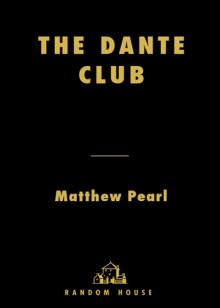 The Dante Club
The Dante Club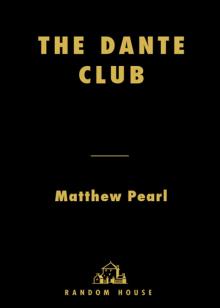 Dante Club
Dante Club The Poe Shadow
The Poe Shadow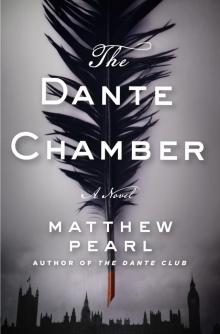 The Dante Chamber
The Dante Chamber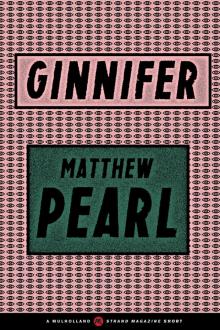 Ginnifer
Ginnifer Company Eight
Company Eight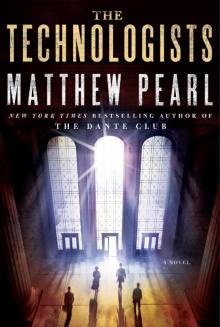 The Technologists
The Technologists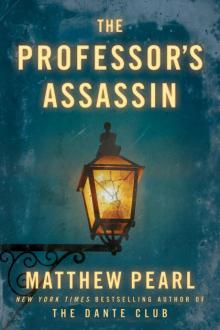 The Professor's Assassin
The Professor's Assassin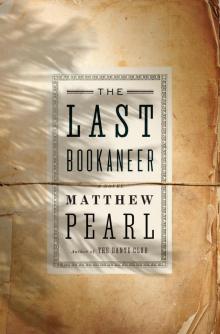 The Last Bookaneer
The Last Bookaneer Company Eight (Kindle Single)
Company Eight (Kindle Single)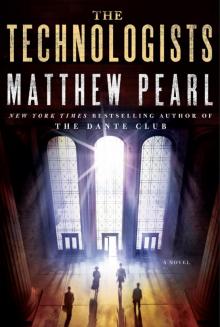 The Technologists: A Novel
The Technologists: A Novel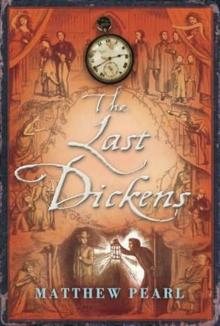 The Last Dickens
The Last Dickens